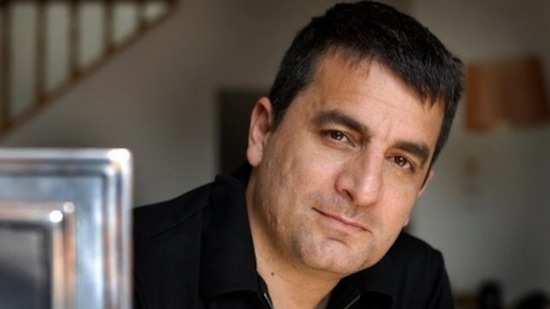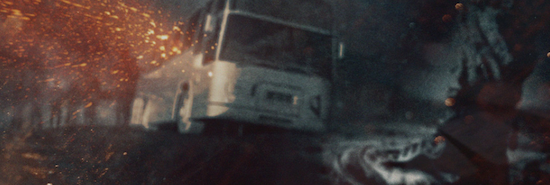Dror Moreh’s Academy Award-nominated documentary, The Gatekeepers, features interviews with all living former heads of the Shin Bet, the Israeli secret service (equivalent to our FBI) for an unprecedented and revelatory accounting of security operations since the 1967 Israeli occupation of the West Bank and Gaza strip. With remarkable candor, Avraham Shalom, Yaakov Peri, Carmi Gillon, Ami Ayalon, Avi Dichter, and Yuval Diskin recount tales of their own successes and failures in leading the Shin Bet.
Shalom observes that “there was no strategy” to end the occupation, “just tactics” to manage terrorism. Director Dror Moreh builds the case of the senior security officials that the lack of leadership from the office of the Prime Minister throughout Israel’s history has resulted in the extended Palestinian occupation. The Gatekeepers are unified in their criticism of policies of the present Israeli administration and their sentiment that the path to peace and security for Israel lies in negotiation: “In the state of Israel, it’s too great a luxury not to speak with our enemies,“ asserts Shalom, “It’s in the nature of the professional intelligence man to talk to everyone. That’s how you get to the bottom of things.” Recently, Sophia Stein sat down with director Dror Moreh to talk about The Gatekeepers, which opens in Los Angeles area theatres this weekend.
Sophia Stein: Most people would assume that the ex-security men in your film would be hawks, but all of them advocate a conciliatory approach, an approach based on a two-state solution. Did you know that before you started filming or was that a surprise to you?
Dror Moreh: I didn’t know that all of them would feel that way. It’s not so random that you see people who have dealt with war all their lives, people who used force, who saw people killed, who tortured people, who have experienced first-hand the horror of war — they turn more and more towards conciliatory solutions, than those who just have a big mouth. It’s not surprising, I think.
S2: The motto of Shin Bet is: “The shield unseen.” But you penetrate that shield. How were you were able to get such intimate, revealing admissions from these men?
DM: The main obstacle was to convince those people to come and speak. That was quite a deal. To thoroughly explain to them what I wanted to do. I believe in total honesty — in that I never tell stories that are not what my true intentions are in creating the film. Having said that, they don’t know how I will combine things — his sentence to his sentence — and create meaning. This is something that I do alone in the editing room with my brilliant editor. All living heads of Shin Bet are in the movie. There is no one who is alive who is out of the film. All of them are in. When I am interviewing, I come with this thick book of questions, but it’s a conversation. And I believe in very long interviews. I don’t believe in ½-hour; I believe in 3-, 4-, 5-hour interviews, each time for a few times, 2-3 times. When I am speaking with someone, I am really interested. I come from interest. At some point in the conversation, where he is leading somewhere that I’m not interested, I will say, “Leave it there.” Wherever I am, I am interested. And that is the source, I think. The secret. … And also, you know, they wanted to speak. At the end of the day, you cannot force the heads of the secret service to speak if he doesn’t want to speak. They wanted to tell what they thought, to tell what they have experienced, and to say it on camera.
S2: They are professional interrogators; in your own words: “These are the guys who persuade other people to betray their country and families.” What kind of language did you use — to break them open?
DM: Like I am speaking with you, honest intimacy. Conversation between two people where one is very interested in the other side, and the other is very interested to share his experience. There was no real technique, just being human.
S2: What did they reveal that surprised you?
DM: At each interview, seventy times at least, my jaw dropped completely, like that. So I cannot signify one thing. There were a lot. Some things that I really regretted not including, because of the time [constraints] of a feature length documentary, are the stories of their childhoods. For example, Avraham Shalom, the oldest of them, was born in the 1930’s in Vienna. Raised in a secular family, he didn’t know that he was a Jew until his minister at the school told him you cannot be in this catechism class because you are a Jew. Avraham saw Hitler coming into Vienna. After Kristallnacht, he suffered; his mother forced him to go to class (because she was a Jewish mother and you cannot miss class!), and he was beaten almost to death by his classmates. He suffered first-hand what it means to have racists against you. What it means when they call you “dirty Jew,” and “dog,” and “you are less than a dog.” And when he says at the end of the movie that we treat the Palestinians like the German occupation force in World War II treated — not the Jews, but the Poles and the Czechs — he experienced that first-hand. So this story was left out. There were a lot of stories — operational stories, killing of terrorist stories, amazing stories that were left out. I am in the middle of making a five-part series for Israeli television that I hope will come to the U.S. And there will be also be a book from the interviews. My next project will probably be a feature narrative film. I am developing [stories] from the things that I know best – intelligence, warfare, fighting terror, this kind of stuff, which will be very relevant to the American public. I am very much attracted to understanding the evil which lies within human nature. I think that war is the real incarnation of human evil. In war, you see human fallibility, human nature at its worst and at its highest.
S2: Gillon describes the foiled plot of right-wingers to blow up the Dome of the Rock. An act, which he claims would have unleashed the fury of the entire Arab world against the State of Israel. What do you see as the larger threat at this point — terrorism from without (the Palestinians) or terrorism from within (the Israeli religious right)?
DM: My point of view is that the internal problem of Israel is much more dangerous than the external problem of Israel. If there is something that will lead to the ruin of Israel, I think it will be the internal problem. When you look at the history — and I look at history, to see history lessons and learn — always, always, the extreme rabbis cause the biggest catastrophes to the Jewish people. Yigal Amir, the assassin of Yitzhak Rabin, was a tool in the hand of those extremists rabbis. Tool. He sits in jail, and they are out – free, to continue spreading their poison. But do you know that a lot of those ultra-extreme right wing settlers are a bad import from the United States, who came because of hok ha-shvut, the right of every Jew, no matter what, whenever he wants, to come to Israel. A lot of those extremists in those settlements are American Jews.
S2: Has the film screened for a Palestinian audience?
DM: Not yet. It’s imperative for me that there will be Palestinians who will watch it. I am not sure that they will like it. The Shin Bet, is the most hated organization in the occupied territories. From the few Palestinians that have seen the film during festival screenings in Europe thus far, some of them came up and hugged me at the end. They felt like they didn’t agree with some of what was said, but for them it was acknowledgement of their suffering. And they have suffered.
S2: What do you hope that President Obama, our elected officials in the US, and US citizens will take away from The Gatekeepers?
DM: Look, from my point of view, the only hope in the middle east, is Obama. I don’t see any kind of leadership within the Israelis and the Palestinians that can move together by themselves, alone towards a solution. I think that it is imperative for Obama to watch the film. I think that the film will cut to the chase and show him the history briefly. I think it will save him a lot of time, and provide him with the know-how of how to deal with the conflict in the middle east. “The Gatekeepers” was done to put a mirror [in front of Israeli society], to show a different point of view of the Israeli-Palestinian conflict than what we hear everyday in the main narrative, which is basically: “Israel always seeks for peace;” “The Palestinians are the ones that are against peace;” “The Arabs are the monsters, and the Israelis are the angels.” No, it’s not so true. And it comes from the heart and the center of the defense establishment. Not from Amos Oz or David Grossman, those leftists. No, all six former heads of Shin Bet are saying that. Deal with that. Try to deal with that.
S2: What do you see as the price of the conflict for your country?
DM: I think we are becoming a professional occupier, with all the negative inherent traits: racism, violence, the deterioration of democracy – which is alarming in Israel, intolerance, the hatred of the other. And in five, ten years maybe, [we risk becoming] a South African apartheid country. You know, a tree which is eaten from within with worms — until it collapses, it is a beautiful tree. But all of a sudden, one blow of a storm — (pup) — completely collapses him.
S2: And for you personally, what has been the price?
DM: The frustration that I have, and the need to create movies like The Gatekeepers. I am not a politician. I will never be a politician. My way to change reality comes from my art, from what I do, which is movies.



